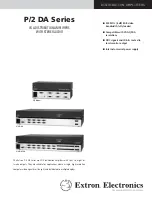
15
En
ADDITI
O
NAL
INFO
RM
A
T
IO
N
Engli
s
h
AUDIO SECTION
• Minimum RMS output power
(8
Ω
, 40 Hz to 20 kHz, 0.2% THD)
[General, Korea, Australia, U.K. and Europe models]
........................................................................... 100 W + 100 W
[China and Asia models] ...................................... 85 W + 85 W
• Input sensitivity/Input impedance (1 kHz, 100 W/8
Ω
)
PHONO (MM) ..................................................... 10.0 mV/47 k
Ω
CD, etc. ................................................................. 500 mV/47 k
Ω
• Output level/Output impedance
CD, etc. (Input 1 kHz, 500 mV)
REC .................................................................. 500 mV/2.2 k
Ω
CD, etc. (Input 1 kHz, 500 mV, 8
Ω
)
PHONES ............................................................ 470 mV/470
Ω
• Frequency response
CD, etc. (20 Hz to 20 kHz) ........................................... 0 ± 0.5 dB
CD, etc. (10 Hz to 100 kHz) ......................................... 0 ± 3.0 dB
• RIAA equalization deviation
PHONO (MM) ................................................................. ± 0.5 dB
• Total harmonic distortion
PHONO (MM) to REC (20 Hz to 20 kHz, 2 V) .... 0.025% or less
CD, etc. to SPEAKERS
(20 Hz to 20 kHz, 50 W, 8
Ω
) .................................... 0.2% or less
• Signal to noise ratio (IHF-A network)
PHONO (MM) (10 mV input shorted) .................. 75 dB or more
CD, etc. (500 mV input shorted) ......................... 100 dB or more
• Residual noise (IHF-A network) ............................................ 70 µV
• Tone control characteristics
BASS
Boost/Cut (50 Hz) ......................................................... ± 10 dB
TREBLE
Boost/Cut (20 kHz) ....................................................... ± 10 dB
GENERAL
• Power supply
[General model] ...................... AC 110-120/220-240 V, 50/60 Hz
[China model]....................................................... AC 220 V, 50Hz
[Korea model] .......................................................AC 220 V, 60Hz
[Australia model] ............................................... AC 240 V, 50 Hz
[U.K. and Europe models] ................................. AC 230 V, 50 Hz
[Asia model] .......................................... AC 220-240 V, 50/60 Hz
• Power consumption
[General, Korea, Australia, U.K. and Europe models]
.......................................................................................... 175 W
[China and Asia models] .................................................... 140 W
• Standby power consumption
[China, Korea, Australia, U.K., Europe and Asia models]
................................................................................ 0.5 W or less
• Dimensions (W
×
H
×
D) ................................ 435
×
141
×
333 mm
• Weight .................................................................................... 6.7 kg
* Specifications are subject to change without notice.
SPECIFICATIONS
Information for Users on Collection and Disposal of Old Equipment
and Used Batteries
These symbols on the products, packaging, and/or accompanying documents mean that used electrical and
electronic products and batteries should not be mixed with general household waste.
For proper treatment, recovery and recycling of old products and used batteries, please take them to
applicable collection points, in accordance with your national legislation and the Directives 2002/96/EC
and 2006/66/EC.
By disposing of these products and batteries correctly, you will help to save valuable resources and prevent
any potential negative effects on human health and the environment which could otherwise arise from
inappropriate waste handling.
For more information about collection and recycling of old products and batteries, please contact your
local municipality, your waste disposal service or the point of sale where you purchased the items.
[Information on Disposal in other Countries outside the European Union]
These symbols are only valid in the European Union. If you wish to discard these items, please contact
your local authorities or dealer and ask for the correct method of disposal.
Note for the battery symbol (bottom two symbol examples):
This symbol might be used in combination with a chemical symbol. In this case it complies with the
requirement set by the Directive for the chemical involved.
















































